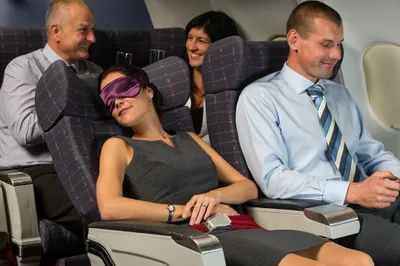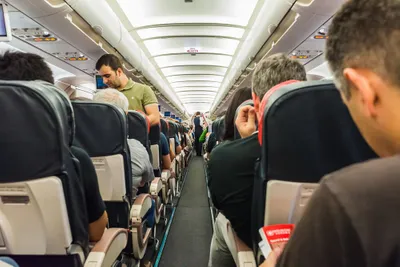Traveling by plane has its highs and lows, and it also has a similar effect on your internal clock when you cross time zones. A long flight into a far-off country can be taxing on you as it is (from sitting in one spot for hours), but so does suddenly being eight-hours in the “future” when you arrive in your destination.
Jet lag can disrupt your vacation and more importantly, can cause problems when you try and return to a regular work/sleep schedule when you return home. Those who travel for business often may have already found their own ways of coping, but here are 6 ways to combat jet fatigue during and after the flight…
1. Consider Staying Awake During the Flight
It’s very tempting to have a snooze on a long flight, from fatigue or even boredom, but it’s not always in your best interest to get some shut-eye in the air. Forbes magazine notes that if you’re going to a destination that will be daytime when you arrive, you should avoid sleep and use the time in the air to relax and get some work done.
The magazine suggests you can help this process by putting “yourself on the timezone of your destination”, meaning you should go to bed earlier if you’re planning to fly east, and do the opposite if heading west. The article suggests starting this cycle several days before your flight if possible.
2. Use Melatonin
Melatonin is your body’s natural sleep hormone, and it also can be taken in pill form to advance natural sleep patterns. Health magazine says it can be your friend when traveling—you can take it after dark on the day you travel to induce sleepiness, and for a few days after. The same can be done in advance if you’re heading east – start taking melatonin in the evening a few days before you depart.
However, the magazine says there are warnings attached to taking melatonin supplements—it can negatively interact with prescription drugs. So while melatonin can be purchased off the shelf, you should speak to your doctor or pharmacist about any possible side effects.
3. Choose your Seat Wisely
Experts recommend paying a bit more for business class seating, or choosing an exit row seat if available. This will allow you to stretch out more and “mimic your sleeping position at home”, noted Forbes magazine.
The article also recommends avoiding aisle seats, so you can use the window area as a place to steady your pillow if you feel the need to sleep. It also means no one will wake you up in order for you to move out of their way. The article also says to avoid the back of the plane, which swings more than the front and is disruptive if you’re trying to catch some zzz’s.
4. Watch your Caffeine Intake
You may be used to a ritual of coffees throughout the day to stay alert, but that may not be your best approach when traveling, according to the National Sleep Foundation. While you can have your morning coffee, the foundation suggests avoiding caffeine and alcohol a few hours before bedtime, as they are stimulants that can keep you awake.
Keep in mind that more than just coffee contains caffeine—you should also avoid tea and don’t choose chocolate as a snack, as it too contains caffeine. It may be tough not to have that second or third cup of Joe, but it will be tougher to try to readjust to a new time zone if your clock is out of whack.
5. Seek Sunshine
The National Sleep Foundation also suggests getting out into the sun as much as possible when you arrive, as natural light will help normalize your sleep patterns and regulate your internal clock. Being indoors excessively can worsen the effects of jetlag, according to the foundation.
If you’re stuck in a conference room and can’t physically get outside, then consider opening blinds to let as much natural light into the room as possible while in session. Head outside during any breaks to soak in the rays and help remind your brain what time of day it is.
6. Remain Active
Traveler’s resource Lonely Planet said traveling long distances can result in what it calls “soul delay”, which roughly means that your body has arrived at the destination but your “soul” hasn’t yet. Instead of turning to a nap to fight this “discombobulated” feeling, the article suggests walking around as much as possible to get the blood circulating.
Another tip from Lonely Planet is to “ride the crazy train” when you arrive at your destination, which is immersing yourself in activity such as 24-hour karaoke in Japan or hitting early morning markets in London. The “hazy sense” of reality can enhance your experiences abroad, but this behavior is not recommended when you return home.









